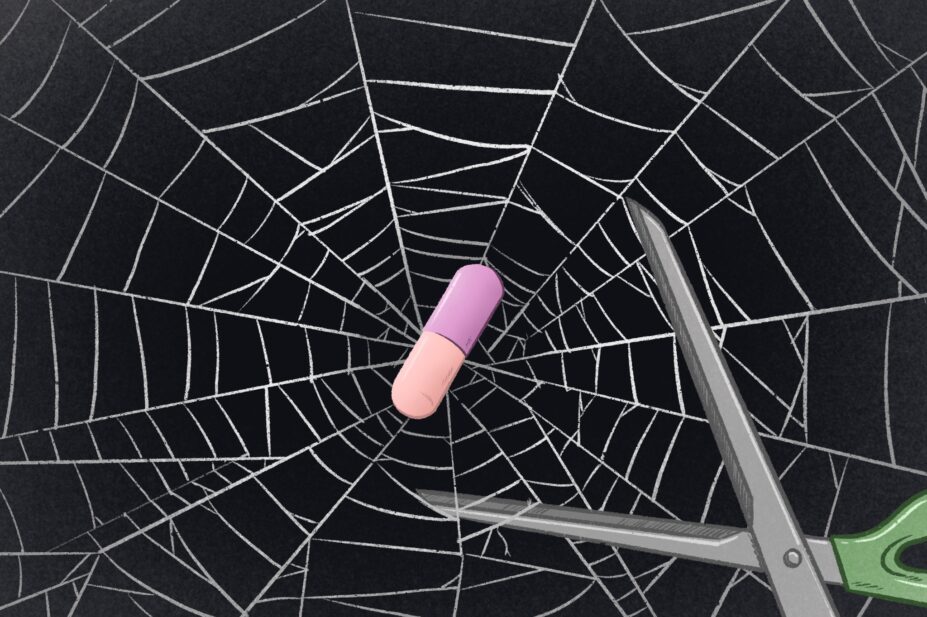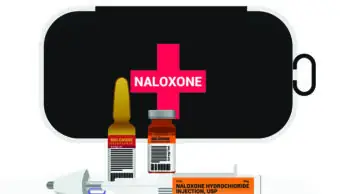
Wes Mountain/The Pharmaceutical Journal
Stigmatising people who use drugs, by ignoring or rejecting them, is “the equivalent of an electric shock in the cycle of drug addiction”, says Nora Volkow, director of the National Institute on Drug Abuse (NIDA) in the United States1. “It’s a powerful social penalty that spurs further drug taking.”
This is the reality for a growing number of people in the UK. The Office for Health Improvement and Disparities (OHID) reported in December 2023 that 290,635 adults contacted drug and alcohol services in 2022/2023 — an 8% increase on the 268,390 adults who contacted these services five years earlier in 2017/20182,3.
To manage this growth in demand, the UK government published its ten-year drug strategy ‘From harm to hope’ in 2021, with a strategic priority to expand treatment capacity by 20% by 2024/2025, while embracing an “all-hands-on deck” approach4.
There is significant evidence that clinicians have a worse attitude towards people with substance use disorder than towards those with other mental and physical health diagnoses
But to achieve this across England will require motivated and highly trained professionals to provide evidence-based interventions in a stigma-free environment — something that is not currently happening in a consistent way across the country.
Understanding is crucial
Addiction is a chronic and treatable health condition, requiring life-saving clinical and non-clinical evidence-based interventions. Yet people who use drugs and alcohol are frequently exposed to negative attitudes and stereotypes within our community — broadly categorised as stigmatisation — which denies them the care they need.
There is significant evidence that clinicians have a worse attitude towards people with substance use disorder (SUD) than towards those with other mental and physical health diagnoses. This may be attributed to clinicians’ lack of exposure to individuals in recovery, a lack of time and resources to adequately care for people with SUDs, or a perception of ‘substance misuse’ as a moral failing5.
Volkow’s article in The New England Journal of Medicine, published in April 2020, recognised that people with SUD might be compelled to use unlawful means to support their habit, such as stealing, lying and aggression, primarily when ‘experiencing withdrawal or intoxication-triggered paranoia’. Such behaviour may alienate the person’s support system and eventually leave them stigmatised among family, strangers and healthcare workers.
Prolonged stigmatisation of people who use alcohol and other drugs can lead them to avoid seeking medical help, creating a missed opportunity for early intervention. It can lead them to receive a poorer quality of care. It can also cause increased drug use and reduced access to harm reduction initiatives such as naloxone supplies, needle exchange programmes and immunisation against blood-borne diseases6,7.
It is therefore imperative that tailored education and training about stigmatisation and discrimination is routinely provided to all healthcare professionals dealing with people who use drug and alcohol treatment services. This should start early in the pharmacy education pathway, with students made aware of the consequences of negative stereotypical attitudes on care provision by exposing them to individuals in treatment and recovery5. The NHS Addictions Provider Alliance (APA) recognised strategies for overcoming stigmatisation must include education to correct inaccurate stereotypes and drug policy reform8. Using the ‘#StigmaKills’ awareness campaign, the NHS APA continually pledges to tackle stigma.
All people with SUD must be treated the same regardless of their health condition, and clinicians should be supported to mitigate the impact of their personal and socio-cultural perceptions on their care for these individuals.
Disparity in service provision
As part of the drive towards equitable access to care for people with SUD, a holistic, collaborative approach between community pharmacy teams and drug treatment services is crucial in helping them recover and in reducing treatment dropout rates.
There is currently a significant disparity in the provision of supervised consumption services for opioid-substitution therapy among community pharmacy contractors
OHID data show that, of the 290,635 adults who contacted drug and alcohol services between April 2022 and March 2023, 137,749 people entered treatment for substance use — 48% of them owing to opioid-related problems2. Nearly all (98%) of these people received community-based structured treatments, but only 46% completed treatment with drug and alcohol services.
Using interventional tools in community pharmacy, such as supervised consumption, signposting potential patients to local drug treatment services and providing harm reduction advice, is therefore vital.
However, there is currently a significant disparity in the provision of supervised consumption services for opioid-substitution therapy (OSTs) among community pharmacy contractors — fuelling stigmatisation of this patient group.
Public Health England recognised supervised consumption of opioid-substitution therapy (OSTs) as an evidence-based intervention for promoting compliance to treatment among people who use drugs9. Where these services are offered, they are locally commissioned as a ‘local enhanced service’, (LES) either through the local authority or via subcontracted providers under drug treatment service provision, using public health grants10. As a LES, community pharmacy contractors may decide to opt in or out and remunerations for the service are usually agreed locally between the local pharmaceutical committees (LPCs) and service commissioners. It is important to note that supervised consumption of OSTs is not a legal requirement under the Misuse of Drugs 2001 Regulations10.
A proactive approach by NHS England to recognise supervised consumption of OSTs as a core essential service within the Terms of Service — meaning all pharmacies would need to offer it — or rather a well-funded National Enhanced Service (NES) may prove beneficial in the fight against opioid-related deaths. The national COVID-19 vaccination service was delivered as a NES, commissioned by NHS England and NHS Improvement, allowing for service specification and remuneration to be discussed and agreed nationally10.
Remuneration to support services
A comprehensive national drive to support the remuneration and service provision of OSTs would move the health system a step closer to ending the stigmatisation of people with SUD.
Dispensing of medicines and appliances ordered on NHS prescriptions remains an essential service under the NHS Community Pharmacy Contractual Framework11. This framework does not allow for discrimination if the medicine ordered is on a standard FP10 (commonly used in primary care) or a blue FP10MDA prescription (commonly used by drug treatment services for their service users). However, clinicians within drug treatment services have witnessed instances where pharmacy contractors refuse to order medicines prescribed on FP10MDAs owing to a host of reasons, contrary to the service specifications.
Issues raised by pharmacy contractors include: poor remuneration for the effort required to prepare OSTs compared with delivering other national services such as Pharmacy First; increased time involved in supervising consumption of OSTs; staff shortages; and an increased focus on lucrative private services, such as travel vaccinations.
Experiences across NHS Inclusion drug treatment services
The NHS Inclusion drug treatment services currently span five integrated care boards across England, with varied experiences of factors driving the improvement and quality of service delivery across the footprint. The negative characterisation of people living with addiction remains conspicuous within clinical and community settings and, in some cases, extends to friends and family members.
People who use our services continue to drop out of treatment — with an increasing number overdosing on opioids
Drug treatment services are also experiencing a reduction in allocated slots at community pharmacies for supervised consumption of OSTs, with some patients refused entry to the pharmacy.
Common themes experienced by our clinicians include patients being permanently banned from the pharmacy premises owing to unlawful behaviour, patients being classed as ‘unworthy’ or too ‘unkempt’ to enter premises, patients being seen as ‘chasing away potential customers’ and patients arriving outside of ‘set times’ specified by the pharmacy managers to supervise consumption — but not having stipulated these times in the service level agreement.
As a result, people who use our services continue to drop out of treatment — with an increasing number overdosing on opioids — and our clinical staff members are frustrated at the situation. Routinely seeking alternative pharmacy providers that are willing to take on patients has created an additional burden on drug treatment services that have already faced unprecedented real-terms funding cuts since 2015/2016. Forcing drug treatment services to negotiate their own competitive prices with pharmacy contractors for supervised consumption of OSTs has worsened disparity in its provision across the country12.
Equitable access to evidence-based interventions remains vital in the fight against the scourging opioid overdose crisis in the UK. Providing compassionate care — not penalising people who use drugs and alcohol — will curtail the social pain associated with their health condition. Pharmacy teams must help bear the burden of substance use disorders in our communities by challenging stigmas.
- 1.Volkow ND. Stigma and the Toll of Addiction. N Engl J Med. 2020;382(14):1289-1290. doi:10.1056/nejmp1917360
- 2.Adult substance misuse treatment statistics 2022 to 2023: report . Office for Health Improvement and Disparities. Published 2023. Accessed July 2024. https://www.gov.uk/government/statistics/substance-misuse-treatment-for-adults-statistics-2022-to-2023/adult-substance-misuse-treatment-statistics-2022-to-2023-report#summary
- 3.Alcohol and drug treatment for adults: statistics summary 2017 to 2018 . Public Health England. Published 2018. Accessed July 2024. https://www.gov.uk/government/statistics/substance-misuse-treatment-for-adults-statistics-2017-to-2018/alcohol-and-drug-treatment-for-adults-statistics-summary-2017-to-2018
- 4.From harm to hope: a ten-year drugs plan to cut crime and save lives. Uk Government. Published 2021. Accessed July 2024. https://www.gov.uk/government/publications/from-harm-to-hope-a-10-year-drugs-plan-to-cut-crime-and-save-lives
- 5.Avery JD, Avery JJ, eds. The Stigma of Addiction. Springer International Publishing; 2019. doi:10.1007/978-3-030-02580-9
- 6.Madden EF, Prevedel S, Light T, Sulzer SH. Intervention Stigma toward Medications for Opioid Use Disorder: A Systematic Review. Substance Use & Misuse. 2021;56(14):2181-2201. doi:10.1080/10826084.2021.1975749
- 7.Volkow ND, Gordon JA, Koob GF. Choosing appropriate language to reduce the stigma around mental illness and substance use disorders. Neuropsychopharmacol. 2021;46(13):2230-2232. doi:10.1038/s41386-021-01069-4
- 8.Session 3 of the NHS APA virtual conference . NHS Addictions Provider Alliance. Published 2023. Accessed July 2024. https://www.nhsapa.org/post/watch-on-demand-session-3-of-the-nhs-apa-virtual-conference-2023
- 9.Part 1: introducing opioid substitution treatment. Public Health England. Published 2021. Accessed July 2024. https://www.gov.uk/government/publications/opioid-substitution-treatment-guide-for-keyworkers/part-1-introducing-opioid-substitution-treatment-ost
- 10.Dispensing Controlled Drugs . Community Pharmacy England. Published 2013. Accessed July 2024. https://cpe.org.uk/dispensing-and-supply/dispensing-process/dispensing-controlled-drugs/#:~:text=Both%20FP10MDA%20and%20WP10MDA%20forms
- 11.NHS Community Pharmacy Contractual Framework Essential Service – Dispensing. Community Pharmacy England. Accessed July 2024. https://cpe.org.uk/wp-content/uploads/2013/07/service20spec20es12020dispensing20_v1201020oct2004_.pdf
- 12.Finch D, Gazzillo A, Vriend M. Investing in the public health grant: What it is and why greater investment is needed. The Health Foundation. Published April 2024. Accessed July 2024. https://www.health.org.uk/news-and-comment/charts-and-infographics/public-health-grant-what-it-is-and-why-greater-investment-is-needed
7 comments
You must be logged in to post a comment.



Pharmacy Services provided for this patient group need to be remunerated on the basis of the care provided rather than product dispensed. In my experience many community pharmacists provide care which is way above that associated with dispensing a product. I have even seen community pharmacists who provide extensive social support for this very vulnerable group without any funding or even recognition. A care service based on an agreed standard of care supported by a quality training package could be partly funded by making use of the dispensing fee replaced by a fee per patient registered for the service with a community pharmacy. This would give the patient the necessary pharmaceutical care support and the community pharmacist the recognition by the wider healthcare system as a care giver rather than simply a provider of a product.
I couldn’t agree more Norman. A progressive shift from current remuneration package to a holistic approach would place community pharmacies firmly at the centre of supported care provision towards this patient group. As we know one size doesn’t fit all and the pharmacy model has shifted from “dispensing numbers” to “quality clinical care provision”, deserving of an equitable financial envelope.
The article does an excellent job of highlighting the challenges faced by people with substance use disorders, especially how stigma can worsen their situation. The use of statistics and expert insights really drives home the point that these individuals often face barriers to getting the care they need. The call for better education and training for healthcare professionals, along with the push for more consistent access to supervised consumption services, feels both timely and necessary. It's a well-written piece that not only informs but also encourages a more compassionate and understanding approach to addiction treatment.
Many thanks for your insight on this important issue
Increased funding is definitely needed for providing these services - in Ontario the provincial government pays the equivalent of £5 a day for daily dispensing for each medication dispensed. The UK has been relatively fortunate to not have been flooded with illicit fentanyl in the same way that the US and Canada have been since 2016 (Canada has had around 46,000 deaths from opioid overdoses since 2016, the vast majority of which are due to fentanyl).
Naloxone should also be available from every pharmacy in the country, at no charge, with a fee from the government that is commensurate with the time needed for training on use of it. Eligibility should be as broad as possible to increase the likelihood of naloxone being available in the event of an overdose, and both injection and nasal spray formulations should be available to reduce barriers to use.
Well said Stephen. Thought provoking the issue of commensurate funding for community pharmacy teams, to provide the right level of care to people with SUDs. There remains the argument that a lot of work done by pharmacy professionals are not usually captured, renumerated or appreciated by policy makers. Equitable access to naloxone, a life-saving drug, with mitigated regulatory restrictions across community settings would have a positive impact in tackling the scourge of opioid-related deaths we face. We are constantly appealing on this matter.
Denis this is right on point. I recall last week my patient bursting out crying because of stigma. I just added a 'yellow caution' sticker to her bloods and she explained how that makes him feel and makes him detached from the service. I have never thought of this
I think the compassionate and non judgemental approach is the way forward if we are to help people with SUD.
Thanks for your insight